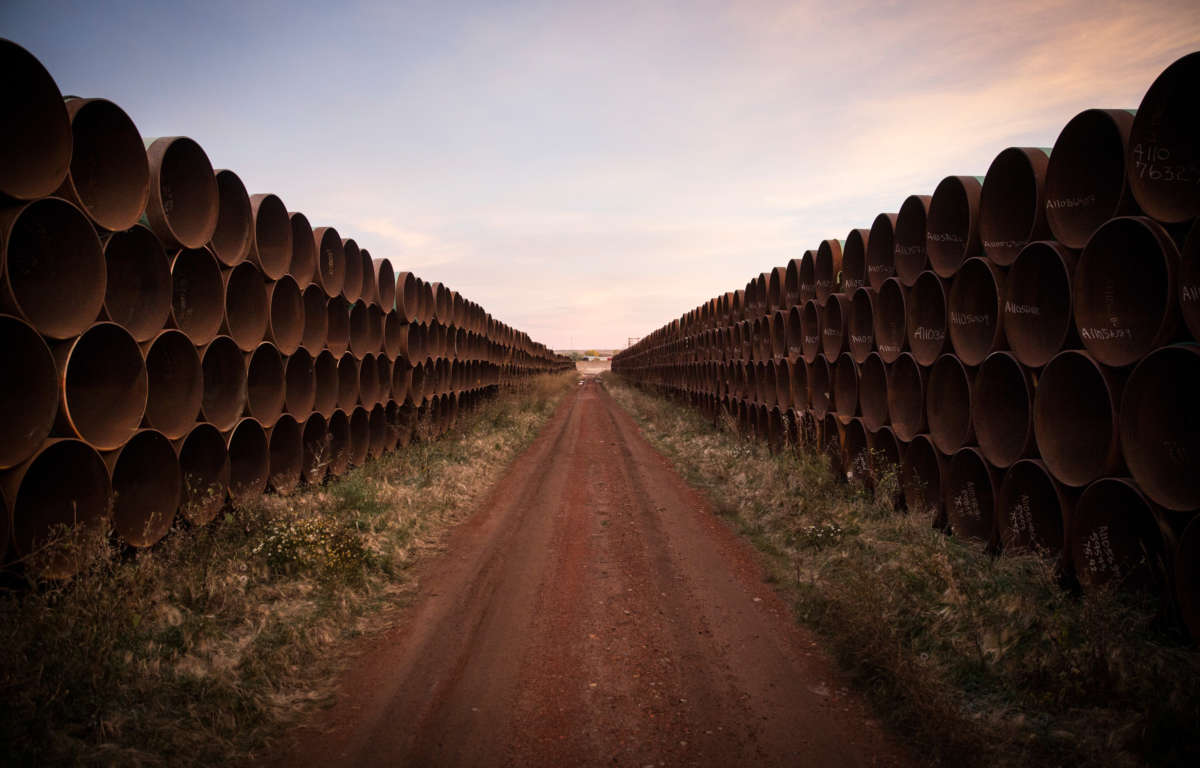Honest, paywall-free news is rare. Please support our boldly independent journalism with a donation of any size.
In a move that progressives described as unsurprising yet outrageous, TC Energy Corporation, the Canadian company behind the now-defunct Keystone XL pipeline, is seeking more than $15 billion in compensation from the United States government, which it has accused of violating free trade obligations by blocking further development of the tar sands oil project.
After President Joe Biden rescinded the Keystone XL permit on the first day of his term, TC Energy announced last month that the pipeline is officially dead, marking a huge victory for the climate movement following a decade of organizing.
“To recover economic damages” stemming from the Biden administration’s cancellation of the project, the fossil fuel giant on Friday filed a Notice of Intent with the U.S. State Department to initiate a legacy North American Free Trade Agreement (NAFTA) claim under the United States-Mexico-Canada Agreement (USMCA).
TC Energy’s decision to sue the U.S. government was denounced by Jane Kleeb, an advocate for progressive rural policies and chair of the Nebraska Democratic Party, who called it “disgusting yet predictable.”
Arguing that “this is how capitalism works,” Kleeb said the Calgary-based corporation—not U.S. taxpayers—should be responsible for bearing the costs of the failed investment. It was TC Energy, after all, that “took the risk,” said Kleeb. She added that the company “lost” when the U.S. rejected its pipeline.
TC Energy reportedly took a $2.2 billion hit last month when it formally pulled the plug on Keystone XL. In addition, the Alberta government, which had invested public money in the project, was liable for $1.3 billion when the pipeline was terminated.
Just days after Biden revoked the Keystone XL permit in January, Kyla Tienhaara, an assistant professor of environmental studies at Queen’s University, warned that Alberta Premier Jason Kenney was “scrambling for a way to recoup some of Alberta’s losses,” and he viewed NAFTA as “offering some hope.”
According to Tienhaara:
The former North American Free Trade Agreement (NAFTA) contained a chapter on investment that allowed foreign investors to sue governments in international arbitration. The owner of Keystone XL—TC Energy (previously TransCanada)—used NAFTA to launch a US$15 billion lawsuit in 2016 after President Barack Obama canceled the project.
At the time, some legal experts thought the company had a reasonable chance of winning. We will never know, because the case was dropped when President Donald Trump indicated he was willing to let the project proceed.
This time may be different if TC Energy chooses to proceed with a claim. NAFTA has been replaced by a new agreement—the U.S.-Mexico-Canada Agreement (USMCA). Unlike NAFTA, USMCA does not permit Canadian investors to sue the U.S. government (or American investors to sue the Canadian government).
Because investments in the Keystone XL pipeline predate USMCA, TC Energy’s lawsuit is still able to invoke NAFTA’s Investor-State Dispute Settlement (ISDS) clause, which allows foreign investors to sue governments for profits that are “lost” due to regulatory interventions.
However, Tienhaara wrote, “TC Energy’s claim may now be weaker because the permit issued by the Trump administration explicitly stated that it could be rescinded, essentially at the president’s whim.”
“Nevertheless,” she added, “many investors have proceeded with claims on the basis of much weaker cases. Investors bet on positive outcomes in arbitration, as much as they bet on governments not taking action to halt catastrophic climate change. This is because the anticipated rewards, in both instances, are high.”
While lamenting the fact that legacy NAFTA claims are permitted until 2023, Canadian environmentalist and human rights activist Maude Barlow, a leading proponent of equitable access to water around the globe, rejoiced that USMCA does not allow ISDS claims.
TC Energy’s announcement of its lawsuit came amid a deadly heat wave in British Columbia and the U.S. Pacific Northwest and just before an underwater gas pipeline burst in the Gulf of Mexico, setting the ocean on fire.
Journalist Emily Atkin on Sunday told CNN’s chief media correspondent Brian Stelter that policymakers are failing to treat the climate crisis “like the planetary emergency that it is.”
While Biden received praise for playing a decisive role in ending the Keystone XL project, the president has yet to exercise his authority to revoke permits for the Dakota Access and Line 3 pipelines. Last month, his administration approved an expansion of Line 3 despite opposition from climate justice campaigners and warnings from scientists who have described the tar sands project as a “climate time bomb.”
Media that fights fascism
Truthout is funded almost entirely by readers — that’s why we can speak truth to power and cut against the mainstream narrative. But independent journalists at Truthout face mounting political repression under Trump.
We rely on your support to survive McCarthyist censorship. Please make a tax-deductible one-time or monthly donation.
